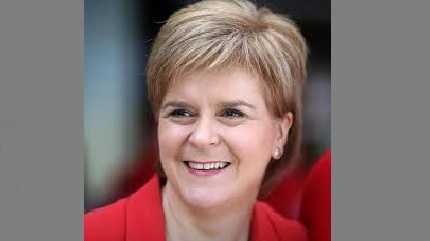
LONDON (AP) — Former Scottish First Minister Nicola Sturgeon, who dominated politics in Scotland for almost a decade, was arrested Sunday by police investigating the finances of the governing, pro-independence Scottish National Party.
Police Scotland said a 52-year-old woman was detained “as a suspect in connection with the ongoing investigation into the funding and finances of the Scottish National Party.”
“The woman is in custody and is being questioned by Police Scotland detectives,” the force said, without naming Sturgeon. British police do not identify suspects until they are charged.
A spokesperson for Sturgeon said the former first minister voluntarily attended an interview with police and would cooperate with the force’s investigation.
The SNP said the party had been “cooperating fully with this investigation and will continue to do so. However it is not appropriate to publicly address any issues while that investigation is ongoing.”
Scottish police opened an investigation in 2021 into how more than 600,000 pounds ($754,000) designated for a Scottish independence campaign was spent.
Two former SNP officials, Colin Beattie, who was treasurer, and Peter Murrell, who was chief executive, were previously arrested and questioned as part of the investigation. Neither has been charged.
Murrell is Sturgeon’s husband, and police searched the couple’s home in Glasgow after his arrest in April.
Sturgeon unexpectedly resigned in February after eight years as Scottish National Party leader and first minister of Scotland’s semi-autonomous government. She said then that she knew “in my head and in my heart” that it was the right time for her, her party and her country to make way for someone else.
The first female leader of Scotland’s devolved government, Sturgeon led her party to dominance in Scottish politics and refashioned the SNP from a largely one-issue party into a dominant governing force with liberal social positions.
She guided her party during three U.K.-wide elections and two Scottish elections, and led Scotland through the coronavirus pandemic, winning praise for her clear, measured communication style.
But Sturgeon left office amid divisions in the SNP and with her main goal — independence from the U.K. for the nation of 5.5 million people — unmet.
Scottish voters backed remaining in the U.K. in a 2014 referendum that was billed as a once-in-a-generation decision. The party wants a new vote, but the U.K. Supreme Court has ruled that Scotland can’t hold one without London’s consent. The central government has refused to authorize another referendum.
Sturgeon’s departure unleashed a tussle for the future of the SNP amid recriminations over the party’s declining membership and divisions over the best path towards independence. Opinion polls suggest support for the party has sagged, though it remains the most popular in Scotland.
An acrimonious leadership contest to replace her saw contenders feud over tactics and Sturgeon’s legacy, particularly a bill she introduced to make it easier for people to legally change gender. It was hailed as a landmark piece of legislation by transgender rights activists, but faced opposition from some SNP members who said it ignored the need to protect single-sex spaces for women
First Minister Humza Yousaf, who won the party contest in March, told the BBC before Sturgeon’s arrest that the SNP had been through “some of the most difficult weeks our party has probably faced, certainly in the modern era.”
“I know there will be people, be it our opposition, be it the media, that have somehow written the SNP off already,” he said. “They do that at their own peril.”




